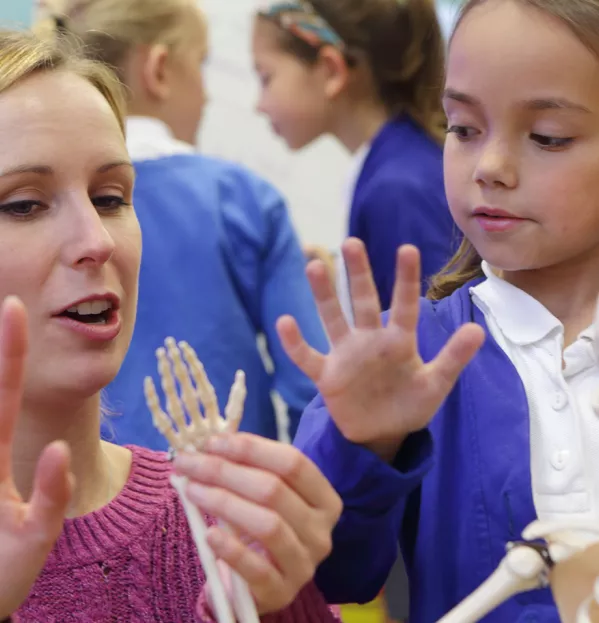- Home
- Teaching & Learning
- Primary
- How to build powerful knowledge at primary school
How to build powerful knowledge at primary school

The word “knowledge” has probably never been used so much in schools as it is now. With our “knowledge-led” curricula and “knowledge-rich” lessons, there can’t be an educator in the country who hasn’t had to start thinking more about knowledge.
Overall, I am happy about this new focus. Michael Young’s concept of “powerful knowledge” resonates with me and I can see how his ideas reverberate through much of the new thinking about what schools are for and how curricula should be developed.
And while I certainly don’t agree with the way schools are so publicly held to account, and the lack of funding available to help them implement the kind of curricula they are held to account for, I believe the emphasis on specialised knowledge is broadly good.
But while school leaders are busy throwing everything in their budgets at curriculum development, they would do well to remember Young’s proclamation in 2014 that “there is no curriculum development without teacher development”.
- Powerful knowledge: What teachers need to understand
- Ofsted: Primaries can work together on curriculum
- Pedagogy: How to get your pupils thinking like experts
It is all very well designing a powerful curriculum, but with initial teacher education and school CPD programmes historically placing more emphasis on generic teaching processes than subject-specific training, there is a danger that the implementation of knowledge-rich curricula may fall flat.
Teachers need help developing not only their knowledge of what they are teaching but also their knowledge of how to teach it. Importantly, this will not be the same for every subject. “Specialist pedagogic knowledge”, as Young suggests, “is no less complex or difficult than subject knowledge itself”.
Powerful knowledge: focusing on both content and pedagogy together
In other words, being a scientist will not make you a science teacher. To improve your science teaching, you need to develop both your scientific understanding and your understanding of general best teaching practice - but you also need an understanding of subject-specific pedagogy.
Until now, doing all three of these things hasn’t been easy, as subject content has often been downplayed as relatively unimportant compared to learning about pedagogical processes like assessment for learning, behaviour management and questioning.
Yet this separation of subject expertise and pedagogy is neither necessary, nor inevitable, as Lee Shulman explains in a 1986 paper on pedagogical content knowledge.
He argues that we must devote as much attention to the “content aspects of teaching” as we do to “elements of the teaching process”. He believes that developing teachers’ PCK (pedagogical content knowledge) is the answer.
Crucially, PCK is more than simply knowing the content, and more than simply knowing about teaching. It involves teachers understanding the most effective forms of “representation of ideas, the most powerful analogies, illustrations, examples, explanations and demonstrations” for the subjects they teach, allowing them to most effectively represent and formulate the subject so that it becomes “comprehensible to others”.
As Shulman asserts, one should be able to tell the difference between a teacher of a subject and a person merely educated in that subject. Indeed, this is what defines the profession of teaching.
Of course, this is a harder proposition for primary teachers. Many are not trained in some subjects past GCSE, and plenty would argue that there are simply too many subjects. But that just makes specialist subject training even more important.
We need to encourage specialist subject pedagogists to come out of the woodwork and train teachers. This will enable teachers to understand and assert the relevance of what they teach, which, for me, is what really lies behind the successful teaching and learning of powerful knowledge.
George Bernard Shaw once said: “He who can, does. He who cannot, teaches.” But, as Shulman implores, we need to disregard this “calamitous insult” to our profession. In fact, he argues, it would be more accurate to say: “Those who can, do. Those who understand, teach.”
Beth Budden is an assistant headteacher at John Ball Primary School in London and a PhD candidate at UCL Institute of Education. she tweets @bethbudden
You need a Tes subscription to read this article
Subscribe now to read this article and get other subscriber-only content:
- Unlimited access to all Tes magazine content
- Exclusive subscriber-only stories
- Award-winning email newsletters
Already a subscriber? Log in
You need a subscription to read this article
Subscribe now to read this article and get other subscriber-only content, including:
- Unlimited access to all Tes magazine content
- Exclusive subscriber-only stories
- Award-winning email newsletters
topics in this article



